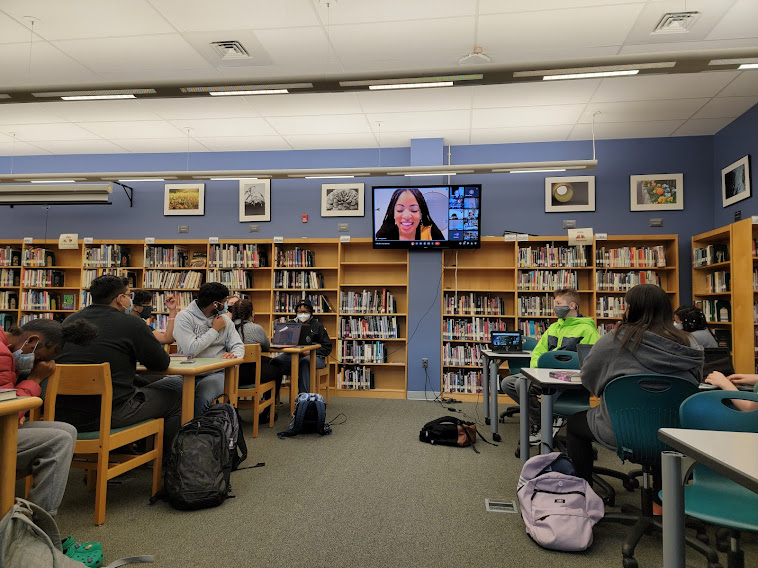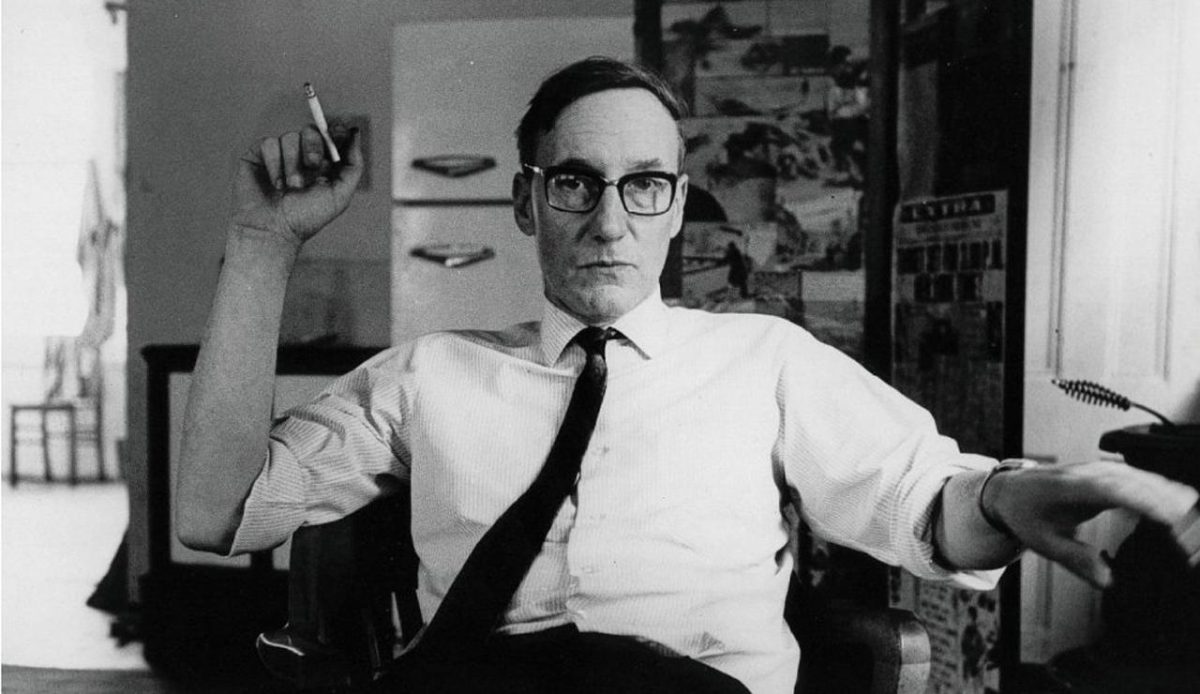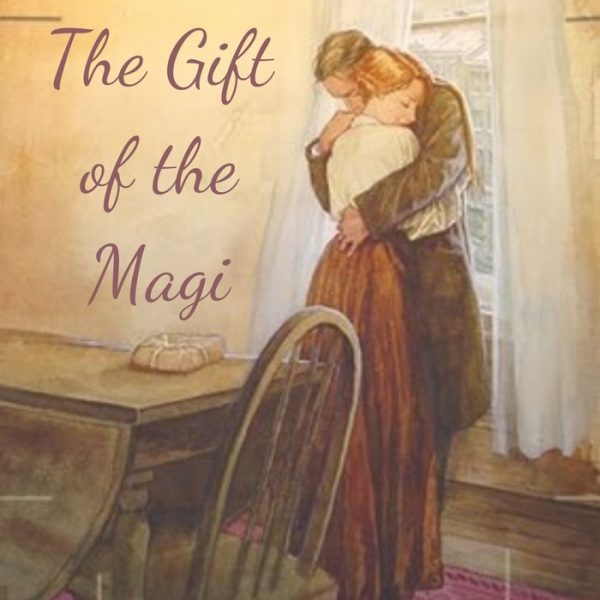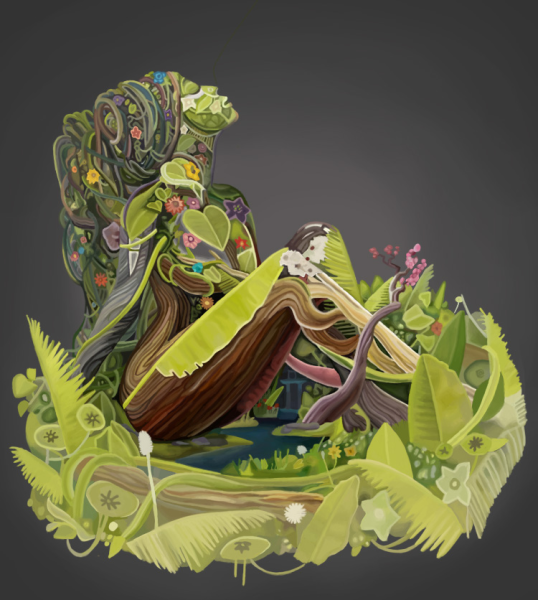Q&A with visiting author Tiffany Jackson
November 5, 2021
Tiffany Jackson, New York Times bestselling author, young adult fiction writer, and horror filmmaker, made a welcoming appearance to an event hosted by Tuscarora high school, and attended by many other FCPS schools. Miss Jackson discussed her newest book White Smoke and gave her insight on writing for young authors. Many students had the opportunity to speak with Tiffany to ask her questions about her techniques and gain a deeper understanding of her other books. After each Q&A, Mrs. Kremnitzer, a literacy specialist at Tuscarora created breakout rooms for the students to join, each regarding a different book the author had written, open to discussions for students that would join. The final online session with Jackson involved her giving the classes and students activities focusing on the writing aspect of her work, games that help get your head moving, asking fundamental questions, adding to writing prompts, practicing description and sensory details. After saying farewell to Tiffany Jackson another was said to the great students and staff who attended the meeting. To end the day at Tuscarora, the students were split into groups of those interested in doing art for the book, writing spinoffs, research, or reading.
Below is a complete write up of the Q&A session Ms. Jackson held with FCPS students during her visit:
(1) What was the process of writing this book?
Perfect question. Um, so the process of writing this book was actually… it was a little tough because I actually started this book kind of right at the height of the pandemic. So I was already trapped in the house at the time. Particularly in Brooklyn… it was quite scary. So being in the house and like all the silence, and we’re not used to, like, in New York, we’re not used to silence, but around March, April the pandemic. You know, you just heard just radio silence throughout the entire apartment building, which is unheard of. So, uh, there was something incredibly eerie about that in itself. Uh, the process actually was also, you know, kind of similar to my other books, like allegedly Monday’s Not Coming was, you know, doing a lot of research and I do a lot of research into hauntings. Uh, so of course, you know, we’re going through this, uh, terrorist terror moment. Um, and I’m reading about all the scary stuff. I was freaking myself out the entire time. So read a lot about hauntings, making sure that I got the accurate information about hauntings, um watching a lot of scary haunted house movies, That’s actually one of my favorites, um, watching, uh, haunted house movies, uh, favorite of the horror genre, um, then sort of also finding out a lot of information about Detroit and a lot of other cities, cause it’s not just Detroit that has all these empty big homes.
There are actually places, a lot of places in the Midwest. Um, particularly in Ohio and Kansas city that have all these homes that are abandoned that no one is doing anything with. So kind of going into that information, you know, finding information, finding out kind of like, you know, the structure behind it. Um, because one of the things I mentioned, you know, in my small presentation is there are a lot of homes that are abandoned and left you know, very decrepit, but they’re actually owned and their owned by real estate developers, and their leaving them that way because they’re waiting for kind of like the big they’re waiting for someone to come in and buy all the homes and basically knock them all down and turn them into condos or check them into like, you know, real estate property, that nature.
So it was really interesting to kind of like digging into like real estate archives and finding that, you know, a bunch of the homes had been bought for like $5 and {inaudible} and in a way that’s actually what makes the city looks far worse than it actually is. They are perfect to look like that. Um, so imagine, if you know, imagine if someone was to leave trash all over your neighborhood and didn’t pick it up and didn’t want anyone to pick it up. That’s what it was like in a lot of these neighborhoods, they were actually leaving trash there to purposely make it look bad. To purposely make it look like it’s worse than it actually is. Um, and so it was very {inaudible} in a lot of ways. Um, so I did a lot of research on that. Um, I talked to a lot of residents from the different cities to talk about, um, what it was like to live in these types of neighborhoods. Um, and then kind of combine the story and you know, one of the things I will say that it was really tough, uh, writing… You know, all my other books that I’ve, you know, kind of sped through, like I was able to write really quickly. This took months and months and months, um, probably the longest and probably one of those books that like, I still say, like, I actually got like real writer’s block. So that was sort of in the process.
(2) What was the most surprising thing about this book?
Hmm. I think, um, probably the most surprising thing is that people want to read them. I’m like still, like I still have so much, um, anxiety and insecurity on my writing. Um, even now we’re like, what’s it like or crying six maybe. Um, I still have moments where like, I doubt that anyone would be interested in any of my stories, um, but everyday improving different. So it’s just about the surprise that people will be interested in these types of books and interested in these are the stories, I guess.
(3) Why discuss her (the main character’s) hyper fixation?
I don’t know. Thank you. Um, uh, so when I wanted to give her anxiety, that was very specific. A lot of times people have anxiety, that’s very all encompassing and I want her to be dive into something that, you know, haunted her. Um, one of the things I am going to try, I was a person who actually did have five years ago and I suffered some of the things I’m already suffered, where I felt like, you know, I felt bugs on me and when they weren’t there, um, that I was looking at any type of black spot in those events. And even though I did have it at the station or anything like that, the fact was that like I had bikes and I never felt comfortable again, like effort. Um, even now, I don’t know all my hotel rooms, I pick up the corners of every mattress. I look too cheap, entitles all of my bedding and towels and everything is white. So I didn’t see things very clearly. So, but my comfort or like color is my clothes. Um, which even then I like, you know, clean all the time. And then I, you know, I there’s so much that I could see myself in Mari. Um, and having something like that that, you know, people maybe have never experienced. Um, it’s hard to explain and then there’s so much shame behind it. So, um, I wanted to do or something that felt like haunting because you feel like you’re trying to explain something to someone that no one can see in the same way that you feel like, you know, you feel like you’re like, there’s a ghost in the house, but no one can see it. And so I wanted to give her back kind of parallel. So why didn’t you just? Um, well, one, like I was kind of mentioning that I, I have always loved that origin.
(4) Why horror-thriller?
It was sort of the first thing that ever really truly read. And I’ve been watching her movies since I was four years old. Um, so in fact it was actually everyone we know, knows what people can do here. You know, even my teachers growing up, it’s actually surprised that, you know, my first clothes for thrillers and that’s so much harder. Um, but there is a large farm per se. There’s a lot, you know, tension and eeriness, that can happen in a thriller. Um, so it was more kind of pivoting my creative muscle to sort of describe the idea that something that’s actually truly scary. And so what’s a better way than like choosing scary is my favorite was just those, um, because I love those stories. I love going to context and said haunted houses and stuff like that. I, uh, in most times it was like domestic cities.I go to, um, I usually take a post tour, so that’s one of my favorite activities to do. Um, because a lot of times when we go and we need to do those tours, you actually learn like the true history of the town or city. Um, I’ve been on good stores in, I think my favorite one, which I actually did a video about this recently. Um, my favorite little store was actually in Savannah. I saw my first real ghost. Um, I also had been to one in Toronto that was actually really previous lawsuit, like a huge city to have sex with the most of the past. Um, of course I’ve been to ones in Berlin’s, um, New York city one and it’s actually really cool too. Um, so there’s something very eerie about that. Um, but anyway, to get back to your original question, yeah, I always knew I was going to cop the heart. It was just not finding the right story. And so it took a couple of years and you know, that started to Detroit really sort of sparked the idea of a haunted house. And I just wanted to go back and also have a message with an insult too.
(5) How do you develop your characters?
Um, well, one of the ways I, aside from the character just popping into my head. Um, one of the ways I help develop the character is by giving them their each individual character in a book, they’re all part of like personality. Um, so I moved to the character development list. Uh, what is their favorite color, what music do they listen to, what would they do when they’re mad? Um, I didn’t go through writing assignments, which we can also do later today. Um, I do a little writing assignments. Like if they were to get into a car accident, what’s the first thing they would do? Um, and every person is different. Some people would immediately call their mother. Some people would immediately call an ambulance. Some evil villains would be like oh nah I’m not here and drive off, like what would they actually do in those circumstances? So sometimes you have to go through and ask yourself, ask your character questions and interview characters to find out who they really are. Um, cause you may love the color blue, but your characters may be into red. Uh, so it’s great to kind of like go through and have a character development journey, um, to find out who they are. Um, they’re being with foods, um, what is in their fridge. Um, because if your character’s a vegan, you will never find like, you know, a half of ham, you know, on their shelf. So, uh, it’s always interesting to kind of, and honestly what their surroundings are like really started to play into their development as well, too. So if they are from New York, they may have a different sort of like stamina or like, you know, take the train every day. They probably don’t know how to drive. Um, if they’re, if they grew up in the city where we have mass transit, um, so really kind of like going through like the everyday, the character really helps development.
(6) How did you get where you are?
I just wanted to say that everything is. It is deeply especially because I am first. I actually published a book recently called. The state being interesting yeah I just want to know like how did you get. That’s right hi. We are today how did you. Authenticity is an all state. Question. Yeah. In other. Because these lockers he recently is likely to use. Thank you. And the first thing you have to like. As an individual is it is. Humanly impossible for everyone to like you and therefore it’s humanly impossible for everyone to like your work your call is to have someone who doesn’t like the word. On the flip side is always someone who does. And you need to focus on those people. Three years the people who are trying to get because usually those people so you didn’t see it was no huge. It was really all word of mouth because in the end the day. Glasheen your stuff is is. How good you are and so the one thing that you can control in life isn’t your own creativity and so just to make sure that every single. The world is your. And in seven G. challenge yourself every single time. Even. Publishing rights well it was a huge challenge for me because I. Hard. And it takes a different set of skills to do. There is something to be said about the idea that every each having something tangible. And that every single chapter ends on a quick note. To make sure that. Apples you know that. And. It’s not easy to do I need to like yeah. But you have to try so the one thing I always tell people is to focus on you over. It is possible on the right focusing on how can I stop my readers and I. And the more readers will like that’s literally like all these great movies all these. Yeah. So kindly. I was able to. He’s working as a. And support for my actual publishing. Because I was. Okay this is. This. Even cheating at the end of the day. You are. Is and the more people I also say that just because a person or people don’t read one book this is me. Oranges. Do not put all your eggs in one basket I always tell people. You want to have a career at work as usual one of the four books she right the more you bring people into your personal. So even today is. This is my. People reading my reading the first and then going back every. So I am now needing to use for a book. January. Allegedly saying. The lady you always make sure that your next book styles your will always.
(7) Do you ever go back and critique an older book?
Oh, oh please. There are so many times where I want to go in and redline like a book as I go along. Or I have done readings where I literally skipped full sentences, like reading aloud to a full audience, skipping sentences and I hate it. Like, you’ll never, you will never be done with a book. Yeah you will never ever be done with a book. You will feel like you want to edit it forever. Another author, my work husband, Justin Reynolds, he wrote The Opposite of Always, always says like the I wish books were more of a living breathing document, it just keeps going and we can speak whenever we feel like it. And I’m like I don’t think that’s how books are supposed to work. Um, so yeah, I do wish that- as much as I may love a book and love the whole concept of it, there are some sentences where I wish like didn’t exist or full on chapters. People always make fun of me because I originally hated my second book, Mondays Not Coming, I hated it. To the point where I liked it when it first came out. And then it blew up, that actually the book that gets the most attention wins all these awards, and I’m like, how? I’m still probably like my redheaded step-child, like I truly cannot understand how anyone could like this book. I thought it was… I thought it was horrible- but I’m also hard on myself, I’m very hard on myself when it comes to writing. So yeah like you never, i still want to change things in it but I try not to touch it.
(8) Why do you build mental health into your book?
I think that, one of the things that I wish we focused on when I was growing up in high school, I wish we focused more on self care because that is a lifelong skill that you will need regardless where you are. And so one of the things that is unfortunate is we didn’t learn a lot about mental health, we didn’t learn how like you know life itself could be truly… It could be hard. You learn very much the hard way unfortunately and when we don’t know the way mental health affects everyone, we can’t seem to have the same type of empathy and compassion for other people. And so one of the things that I realized very much as a child is you know the idea of postpartum depression and how my own mother was going through that and I didnt know what was wrong with her, I didn’t understand, I was getting frustrated with her. And then someone brought it to my attention that someone could be very sad and beat themselves up and how you can be gentle with them and love them with a different kind of compassion. Even as a teenager. Me and my brother are uh… I should know this- 14 years apart so this was something I had to learn, unlearn my kind of strong woman / strong black woman mentality and actually learn to you know fold stays for my mother at a young age. And thinking about that, thinking about the ideas of you know how typically a lot in the black community we’re told that therapy, you don’t need- you don’t need therapy, you just have to pray about it. And sometimes that’s not always the case, sometimes we really truly need to talk about things. And so I wanted to talk about the ideas of mental health and how it actually affects all of us. And I want kids to learn about it at a much earlier age than I did. So I guess that’s one of the biggest reasons why and that’s actually one of the reasons why I talk about a lot of things in my books because I want everyone to learn about it at much earlier age because when you do eventually get to the world, you won’t be so shocked by it. When you finally do get to college, you are going to experience everything and it’s gonna be such a shock to the system and a lot of people you know, sometimes they don’t make it, it’s too overwhelming. And I don’t want that to happen to you, I want you to go out into the world and know about it. Maybe not, you don’t have to experience it but to know about it and empathize with other people going through it and having passion for those people. Could potentially also take action and also help those people so that you know things like suicide or you know injustice doesn’t actually have to happen again if you are actually part of the solution. So I believe in raising more of a proactive generation than a reactive generation. Meaning that I want you guys to actually know this information going forward than to actually have to react to it and deal with it at the time.
(9) How do you build character without making stereotypes?
That’s a good question, and I hate stereotypes. I have always grown up being stereotyped. When I was like… I remember seeing- or no, I remember reading this book in high school and it was supposed to describe what New York City kids are like, and I’m like, ‘we’re not like this.’ The book described that every corner had drug dealers and stuff like that and I was like ‘uh no, that’s not, that’s not the case at all.’ Yeah some areas can be rough but that’s in every city/town in the world. But I thought it was interesting how people were assuming that being black was a monolift that we were all kind of going through the struggle, and that’s not always the case. And so a part of me really wanted to dive into the newanses of being a black girl, and talk about it from other perspectives. But I also really like giving a reason behind it. Um, how do I say this? So I believed in, I believe in doing research. That’s one of the biggest ways I’ve been able to combat stereotyping, is I believe in unpacking issues, compartmentalizing them, analyzing like ya know their beginnings, ask the clarifying questions, and build the story from there. And that way you can actually see everything, all the cards at the table and let you guys deduct your own reasoning and conclusions, like all your own conclusions from those sort of building blocks. For example, a lot of times when you hear something like ‘oh, Timmy stole a loaf of bread’ and immediately people are like ‘Timmy is a criminal’ ‘Timmy needs to be in prison.’ No one stops down, no one stops down to think like, why would Timmy need to steal a loaf of bread? Why would anyone need to steal food? Everyone immediately goes, they must be a criminal versus actually thinking why would anyone need to steal anything? Obviously they are not being supported, obviously something is happening at home. What is going on in that realm? And I want more of us to start thinking from that deep perspective. Instead of saying like ya know, I feel like every quote on quote villain has an origin story and we should start thinking of the origin story and start thinking about finding some type of compassion to that origin story so that hopefully we can actually revert that from happening again. I’m not justifying anyone’s evil actions, this is just an example that I will say that there is something to be said about looking at the perspective of ‘why did you do that,’ asking the question why.
(10) The difference between representing a group and being a token?
Well first of all I think accurate representation means you accurately represent the world that we actually live in, like we’re living today. So whenever I see a story that doesn’t include you know diverse characters or LGBTQ is not represented, I know the story is missing a lot. There’s nowhere in this world, nowhere in this country that you can touch where even those, the people in those divisions are not represented, like it’s humanly impossible at this point. It doesn’t matter where you go. So I believe in having stories that represent everyone. So I guess that’s like the biggest, I mean I guess that’s kind of like what I always think, I mean I guess, you know. Whenever I see a story that I like- and also I believe {inaudible} to the nuances of peoples culture. There is a book I’m gonna link to this Thursday. I’m so sorry but it’s called Firekeeper’s Daughter and it’s a Native American thriller. It’s a- I’m reading it now or I’m listening to the audio book now and it’s amazing because the author is in there {inaudible} it talks a lot about tribe traditions and practices, and it adds so much texture to the story that you would never get from somebody else writing that. And I’m not necessarily saying that you have to be particularly from that particular ethnicity etcetera to write a really good story but damn sure you better do all of your research, I mean you need to know things forwards and backwards, you need to be an expert. You need to literally- like whenever somebody says ‘oh I’m going to write a story based in Brooklyn’… I’m always like, you need to have a masters degree in Brooklyn in order to do that.
I do believe in writing what you know because a lot of people always say like you know- oh I had a girl that said ‘oh my town is so boring’ and I was like absolutely not… absolutely not, no, no way your town is boring. Every town has some hidden dark secret and you have to dive into that. Like if you are me who {inaudible} I don’t know one town that isn’t hit. Or one grandma who happens to have a gun and you don’t know why, you can build on that stoy like there is no excuse to say that you know {inaudible} there’s always something that, I’m talking real like perspective {inaudible}…
















